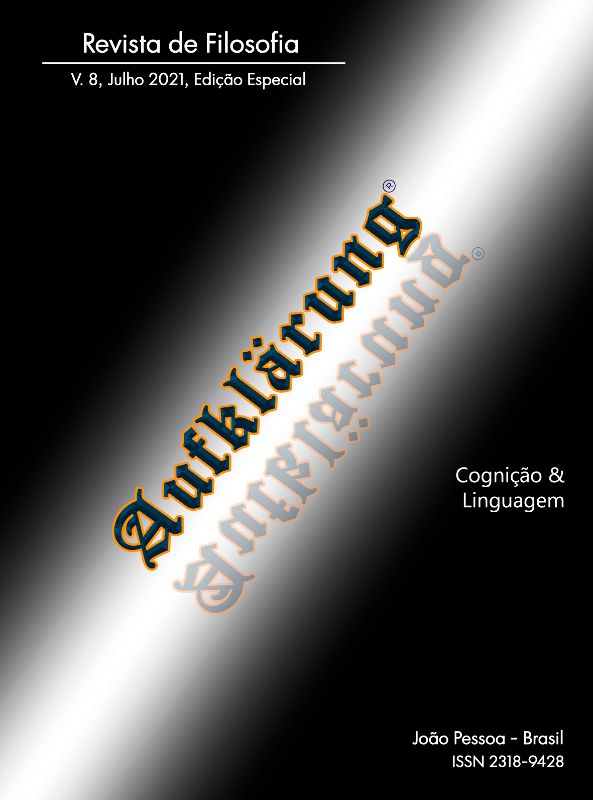Uma consideração linguística de termos singulares
DOI:
https://doi.org/10.18012/arf.v8iesp.60029Keywords:
termos singulares, definição, singularidade, referência, VendlerAbstract
Vendler (1967b) discute como podemos reconhecer linguisticamente um termo singular. Mesmo que termos singulares sejam relevantes para a filosofia e não necessariamente para a lingüística, pode ser enriquecedor saber o que podemos fazer para eliminar a ambigüidade de tal termo. Filosoficamente, os termos singulares são vistos como descrições definidas singulares que podem ser usadas para se referir a uma entidade única no mundo. Vendler tentou fornecer uma explicação sintática de termos singulares e não foi levado em consideração pelos filósofos. Lingüisticamente falando, um termo singular será uma sintagma determinante definida singular que pode ou não estar correlacionada a algo. Mostraremos que uma consideração estritamente sintática, como o proposto por Vendler, é deficiente e não oferece as condições necessárias e suficientes para o reconhecimento de um termo singular. Levaremos em consideração o espírito de Vendler. Usaremos os avanços da linguística para explicar como podemos formar um termo singular e fornecer condições sintático-semânticas para reconhecer um termo singular.
Downloads
References
ABBOTT, B. Reference. New York: Oxford University Press, 2010.
BORER, H. Structuring sense: in name only. Oxford: Oxford University Press, 2005.
BORIK, O.; ESPINAL T. On definite kinds. Recherches Linguistiques de Vincennes, v. 41, n. 1. p. 123-146, 2012.
BURGE, T. Truth and mass terms. Journal of Philosophy, v. 69, p. 263-282, 1972.
CHRISTOPHERSEN, P. The articles: a study of their theory and use in English. Copenhagen: Munksgaard. 1939.
CINQUE, G. Typological studies: word order and relative clauses. New York; London: Routledge, 2013.
DEVITT, M. The case for referential descriptions. In: REIMER, M.; BEZUIDENHOUT, A. (Eds.) Descriptions and beyond. Oxford: Oxford University Press, 2004. p. 234-260.
ENÇ, M. The semantics of specificity. Linguistic Inquiry, v. 22, n. 1, p. 01-25, 1991.
FREGE, G. On sense and reference. In: BLACK, M.; GEACH, P. (Eds.) Translations from the philosophical writings of Gottlob Frege, Oxford: Basil Blackwell, 1960. p. 56-68.
FREGE G. On Concept and Object. In: BLACK, M.; GEACH, P. (Eds.) Translations from the philosophical writings of Gottlob Frege, Oxford: Basil Blackwell, 1960. p. 42-56.
HALE, B. Singular Terms. In: MCGUINNESS B.; OLIVERI, G. (Eds.) The philosophy of Michael Dummett. Dordrecht: Springer, 1994. p. 268-272.
HARBOUR, D. Mass, non-singularity and augmentation. MIT Working Papers in Linguistics, v. 49, p. 239-266, 2008.
HARRIS, Z. Co-occurrence and transformation in linguistic structure. Language, v. 33, n. 3, p. 283-340, 1957.
HEIM, I. The semantics of definite and indefinite noun phrases. PhD Dissertation (Doctor of Philosophy), University of Massachusetts, 1982.
HINTIKKA, J. Are there nonexistent objects? Why not? But where are they? In: HINTIKKA, J. The logic of epistemology and the epistemology of logic: selected essays. Dordrecht: Kluwer, 1989. p. 37-44.
KAYNE, R. The antisymmetry of syntax. Cambridge, MA: MIT Press, 1974.
KRIFKA, M.; PELLETIER, F. J.; CARLSON, G.; TER MEULEN, A.; LINK, G.; CHIERCHIA, G. Genericity: an introduction. In: CARLSON, G.; PELLETIER, F. J. (Eds.) The generic book. Chicago: University of Chicago Press, 1995. p. 01-124.
MARANTZ, A. No escape from syntax: don’t try morphological analysis in the privacy of your own lexicon. In: DIMITRIADIS, A.; SIEGEL, L.; SUREK-CLARK, C.; WILLIAMS, A. (Eds) PWPL 4.2, Proceedings of the 21st Annual Penn Linguistics Colloquium. Pennsylvania: University of Pennsylvania Working Papers in Linguistics, 1997. p. 201-225.
MILSARK, G. Existential sentences in english. Cambridge, MA: MIT doctoral dissertation. 1974.
POLAKOF, A. Lo concreto y lo abstracto en nominalizaciones de adjetivales. Revista Signos. Estudios de Lingüística, v. 52, n. 100, p. 410-431, 2019.
POLAKOF, A. La semántica de los nombres abstractos. In: BÉRTOLA, C.; OGGIANI, C.; POLAKOF, A. (Eds.) Estudios de lengua y gramática. Montevideo: In press.
RUSSELL, B. On Denoting. Mind, v. 14, p. 479-493, 1905.
RUSSELL, B. Descriptions. In: MARTINICH, A. P. (Ed.) The philosophy of language. Oxford: Oxford University Press, 1996. p. 208-214.
STIRTON, W. R. Singular term, subject and predicate. The Philosophical Quarterly, v. 50, n. 199, p. 191-207, 2000.
STRAWSON, P. On referring. Mind, v. 59, n. 235. p. 320-344, 1950.
VENDLER, Z. Linguistics in philosophy. Ithaca; London: Cornell University Press, 1967a.
VENDLER, Z. Singular terms. In: VENDLER, Z. Linguistics in philosophy. Ithaca; London: Cornell University Press, 1967. p. 147-171. (1967b)
VERGNAUD, J.R. French relative clauses. Ph.D. Dissertation, MIT, 1974.
VERGNAUD, J. R.; ZUBIZARRETA, M. L. The definite determiner and the inalienable constructions in French and in English. Linguistic Inquiry, v. 23, n. 4, p. 595-652, 1992.
WETZEL, L. Dummett's criteria for singular terms. Mind, v. 99, n. 394, p. 239-254, 1990.
Additional Files
Published
How to Cite
Issue
Section
License

This work is licensed under a Creative Commons Attribution 4.0 International License.
Journal general policy
1.This journal works under a Creative Commons License aplied to online journals. That icence can be read in the following link: Creative Commons Attribution 4.0 International (CC BY 4.0).
2.Accordingly to this License, a)the journal declares that authors hold the copyright of their articles without restrictions, and they can archieve them as post-print elsewhere. b)the journal allow the author(s) to retain publishing rights without restrictions.
Metadata Policy for information describing items in the repository
1. Anyone may access the metadata free of charge at anytime.
2.The metadata may be re-used in any medium without prior permission, even commercial purposes provided the OAI Identifier or a link to the original metadata record are given, under the terms of a CC BY license refered for the Journal.







































